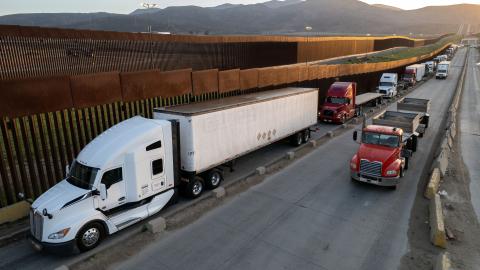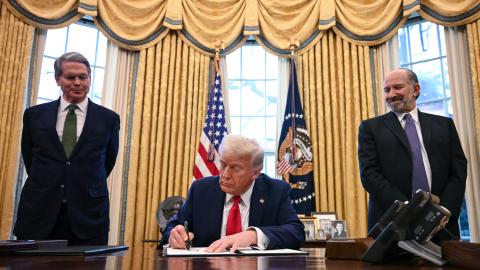We are entering an age of energy abundance. Or not. In keeping with the great tradition of economics, dubbed the dismal science by Thomas Carlyle, let me raise a cautionary note. That which God has showered upon us, politicians can make unavailable. Not only because they must balance the need for energy supplies adequate to support economic growth against the need to prevent unnecessary damage to the environment. More important from their point of view, they have to appease voters who want both cheap energy, which means coal, and greener energy sources that are more costly.
Let's start with coal, a fuel that damages the earth's surface when removed by strip mining, causes deaths when removed from underground mines, and pollutes the air. America styles itself "the Saudi Arabia of coal," and with reason. A single mine in Wyoming produces three tons of coal per second, and we sit on 250 years of reserves.
But America is at a turning point. If President Barack Obama is re-elected, it is certain that there soon will be no new coal-fired electricity generating plants in the United States; if the Romneys take up residence at 1600 Pennsylvania Avenue, the new president will do all he can to relax restrictions on the mining and use of coal and encourage the deployment of clean coal technology. All of which matters not at all to emission levels, since use of coal by emerging nations will continue to rise as their need for cheap electricity soars, with a consequent worldwide increase in carbon dioxide levels. America cannot much affect the impact of the burning of coal on worldwide emissions. The Manhattan Institute's Robert Bryce says that even if US emissions had been cut to zero in the past decade, global emissions would still have increased.
Natural gas is the other fuel with which America is amply endowed. New technologies have made vast amounts of shale gas available, driving prices so low that it is now cheaper than coal and, some say, is likely to remain so. There is a multi-billion-dollar rush to build terminals for exporting the stuff.
That has brought howls of anguish from the petrochemical and other industries that want to keep this cheap fuel at home, rather than make it available for overseas competitors. Meanwhile, environmentalists are battling to stop "fracking," the new technology that makes shale gas economically available. Artists Against Fracking, backed by Yoko Ono, has added its celebrity power to the campaign to force Andrew Cuomo, governor of New York State, to review his decision to allow local counties, more desperate for new jobs than the celebrities, to give fracking the go-ahead if it is not a threat to water supplies. A re-elected Obama will certainly take a dim view of fracking.
Making shale gas an environmental villain like coal suits the Obama administration, as do restrictions on the storage of nuclear waste and regulations to slow development of America's oil resources.
The goal is to turn the energy economy green, heavily reliant on wind and solar power.
Green is increasingly the colour of choice for politicians around the world. Not even impending shortages of electricity capacity can deter the governments of Britain and Germany, to cite just two, from pursuing costly efforts to phase out fossil fuels.
In Britain, the high cost of nuclear plants has forced cancellation of plans for new construction--unless the government comes up with subsidies, or permission to load costs on consumers' bills. To meet promises of draconian cuts in emissions, promises that seem increasingly unlikely to be kept, this and future governments will have to subsidise wind and solar power. Neither source is located near main consuming centres, and therefore requires the construction of high-voltage lines to move supply to demand.
In Germany, after the Fukushima disaster, Angela Merkel reverted to her previous policy of phasing out nuclear power, to be replaced with renewables by 2022. Small problem No1: the renewables surcharge that is loaded on utility bills is already unpopular and is set to go up still more, raising household utility bills by some 7%. Small problem No2: the wind is in the north, consumers are in the south, and the 5,000km of high-voltage transmission lines needed to join supply with demand are tied up by litigation and local opposition. Germany's utilities, which will be around in 2022, long after the chancellor has left politics, know that renewables cannot meet the country's future needs and that they will be held responsible for shortages and ever-higher prices, and so they are building 23 coal-fired power stations to make up for the loss of nuclear capacity.
In America, only a few utilities have opted to build new nuclear plants, while the more sensible ones rely increasingly on natural gas, and will continue to do so unless Fukushima recedes from memory, the government allows the nuclear waste repository in Nevada to open, and nuclear power becomes cost-competitive with gas and coal--all highly unlikely.
In America, the future of fracking is uncertain, and the government is severely limiting permits to drill for oil on federal lands and offshore. Environmental groups are suing to prevent the government from granting permits to companies that want to gobble up land for huge solar projects, local groups are fighting the construction of transmission lines to link wind farms with urban centres, and producers of renewable equipment and electric cars are finding it impossible to repay their government loans and subsidies.
There's more, but you get the idea. The age of nature's abundance might prove to be an age of electricity shortages, of higher rather than lower carbon emissions as coal plants are pressed into service because renewables are too costly and unreliable and transmission lines are unbuilt, of supplies of natural gas limited by restrictions on fracking, and of petrol prices driven up by restrictions on drilling for new supplies of domestic crude oil. Dismal, indeed.

















